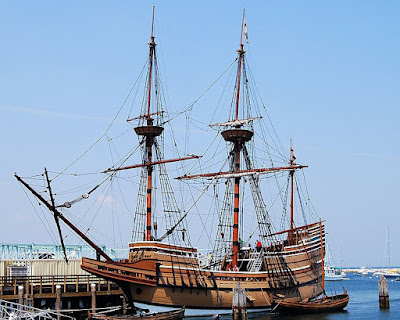Peregrine White
b. late November, 1620 d. July 20, 1704
One very cool piece of reality is that this is his baby cradle brought from England in anticipation of his birth. Talk about optimism! It was used by successive generations of his Winslow half-descendants and finally donated to a museum. It is Dutch wickerwork, and is considered one of the treasures of the time period.
The Mayflower landed on November 9, 1620. His biological father, William White, was one of the signers of the Mayflower Compact on November 21, 1620, and Peregrine was born probably before December began. You may recall that the calendars changed in 1582 from Julian to Gregorian, and it took a while before everyone was on the "same page" with this. So dates often need checking. Sources vary on which dating system was used to record some events. William died in February of 1621, and his mother married Edward Winslow who became one of the primary leaders of the Plymouth Colony. Incidentally, a portrait was made of Winslow, probably the only real likeness of a Mayflower passenger. [see my notes in Susanna's entry as to why I reject that possible picture of her]
I've seen the replica of the Mayflower, and believe me, it's hard to picture 100 people traversing the ocean in a ship that isn't as big as a moderate sized house. I can't find my pictures from that trip, so you'll have to do with a picture from Wikipedia (credited to Paul Keleher)
At any rate, baby Peregrine (meaning wanderer or Pilgrim as he is sometimes called), grew up in the Plymouth Colony which grew into a stockaded village about a half-mile in length on each side. You have to wonder what life would have been like for a child in those conditions.
He married Sarah Basset in 1648. Sarah's family came to America in 1621 on the ship Fortune. Interestingly enough, Peregrine and Sarah were fined for fornication, since son Daniel (my ancestor) was born a bit too soon in 1649!
The family had moved to the village of Marshfield. Peregrine and Sarah had six children who lived to adulthood. There are two remaining images of his original house which survived until the late 1800s. This is one that was produced around 1890 for stereopticon viewing. The land was given to him by his father-in-law William Basset, Sr.
He became a Lieutenant and then a Captain in the local militia. In 1651, he was declared a Freeman, which gave him the right to vote.
Very little is known about his adult years. He could easily have become a colonial leader, as did his younger half-brother Josiah. But he seems not to have taken this pathway, other than being appointed deputy of Marshfield in 1662. There are no letters or papers of his that have survived, and we don't have any real hints of how he thought or felt, although his name appears fairly regularly in records of Marshfield.
In 1674, he gave his land to Daniel and seems to disappear from public records. However, in 1696, at the age of 78, he became a member of the church at Marshfield! His biographer speculates that some memorable event occurred that caused him to withdraw.
His will survives, and leaves land and/or possessions to his children: Daniel, Jonathan, Peregrine Jr., Sarah, and Mercy. Son Sylvanus (born between Sarah and Mercy) had died in 1688. Wills of the time usually listed an inventory of goods, and his list is fairly long including such ordinary items as a gun, hatchett, bedstead, table, chairs, books, linens, cows, sheep, and bees.
One other tangible evidence of his life is a piece of wood that was saved from an apple tree he is supposed to have planted, that lived until the late 1800s.
An obituary appears in the Boston News-Letter, one of the earliest newspapers in America. "He was vigorous and of a comely aspect to the last." His death is recorded on July 20, 1704. It ends with the cryptic sentence, "Although he was in the former part of his life extravagant, yet was much reformed in his last years, and died hopefully." I'm not sure what conservative Puritans would have considered extravagant, but perhaps I also come by an adventurous gene or two through Peregrine.
The last passenger on the Mayflower died in 1699, unless you allow that the unborn Peregrine was also a passenger. Then, he wins the honor.
This is his actual signature.
In other news: I edited and I wrote another 1099 words.
 | See The Pedigree |



2 comments:
How interesting. You've learned quite a lot about him.
Ann- Too bad that's about all there is.
Post a Comment